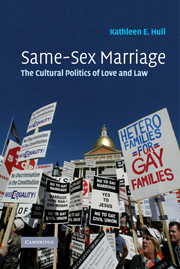Book contents
- Frontmatter
- Contents
- List of tables
- Preface
- Same-sex marriage timeline
- 1 Marriage, culture and law
- 2 Doing the rite thing: cultural practices of commitment
- 3 How do I love thee? Questioning the marriage model
- 4 Making it legal: marriage, law and legality
- 5 Sin or civil right? Debating marriage in the states
- 6 Conclusion: marriage and beyond
- Epilogue
- Appendix A Interview guides
- Appendix B Sample characteristics
- Appendix C Study participants
- Notes
- Court cases
- References
- Index
3 - How do I love thee? Questioning the marriage model
Published online by Cambridge University Press: 05 June 2012
- Frontmatter
- Contents
- List of tables
- Preface
- Same-sex marriage timeline
- 1 Marriage, culture and law
- 2 Doing the rite thing: cultural practices of commitment
- 3 How do I love thee? Questioning the marriage model
- 4 Making it legal: marriage, law and legality
- 5 Sin or civil right? Debating marriage in the states
- 6 Conclusion: marriage and beyond
- Epilogue
- Appendix A Interview guides
- Appendix B Sample characteristics
- Appendix C Study participants
- Notes
- Court cases
- References
- Index
Summary
Marriage is a great institution, but I'm not ready for an institution yet.
– Mae WestA casual observer of recent media coverage of same-sex marriage developments might easily get the impression that all gays and lesbians (or at least all those in relationships) are enthusiastic proponents of marriage in both its cultural and legal forms. In February 2004, hundreds of same-sex couples waited in line for hours on the cold, rainy streets outside San Francisco's City Hall for the chance to obtain marriage licenses of dubious validity. Around the country, same-sex couples have been willing to construct commitment rituals ranging from the traditional to the innovative, the small-scale to the grandiose (including “mass weddings” performed at recent gay rights marches in Washington, DC and elsewhere), even with the knowledge that these rituals would not bring any change in legal status for the couples. When Vermont began offering civil unions in 2000, it turned out that the large majority of people who flocked to this new legal status were out-of-staters, couples drawn to the chance to have a government formalize their commitment even though their new status would not be recognized in the states where they lived. And the scenes from Massachusetts on May 17, 2004 were dramatic and emotionally charged: hundreds of same-sex couples leaped at the opportunity to enter legal marriages and obtained their marriage licenses against a backdrop of cheering crowds of supporters.
- Type
- Chapter
- Information
- Same-Sex MarriageThe Cultural Politics of Love and Law, pp. 78 - 115Publisher: Cambridge University PressPrint publication year: 2006



